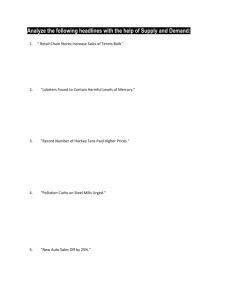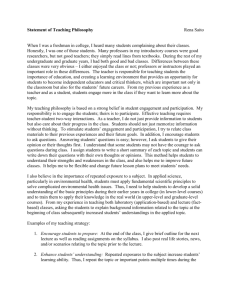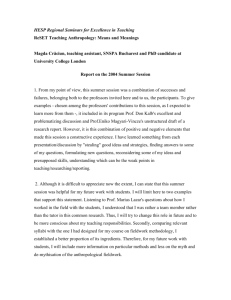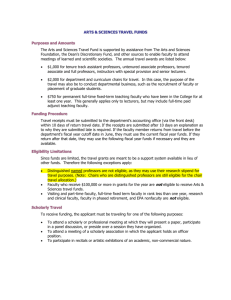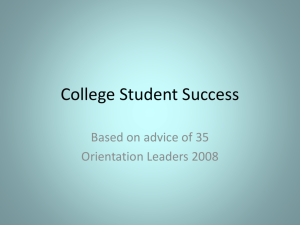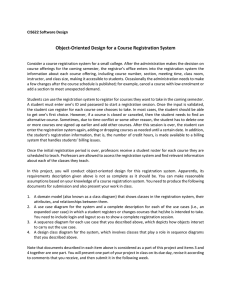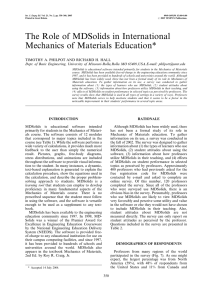listening - Center for Academic Success
advertisement
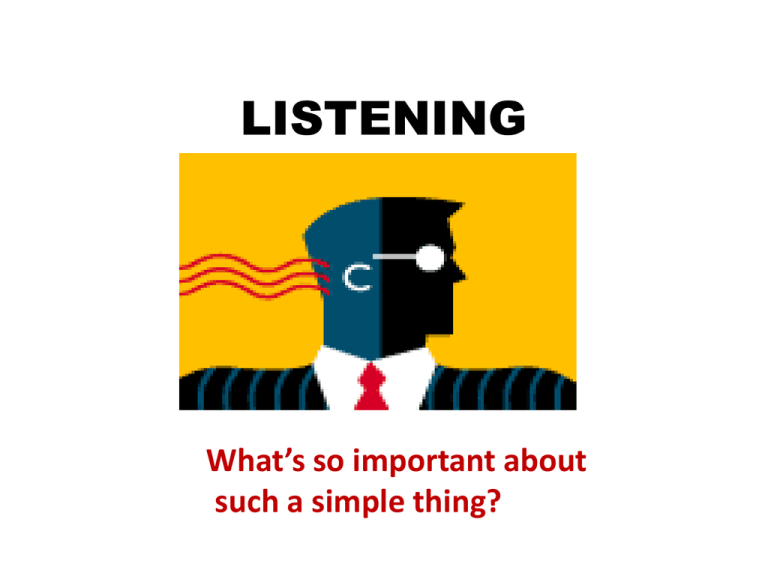
LISTENING What’s so important about such a simple thing? so, $3,065 per course 37½ hours in class per semester $82.00 per lecture hour in 2008-09 “Spoon-fed” the information, not needing to listen hard The higher you go in higher education, the less you are going to be given all the right answers to be “regurgitated” later YOUR 4 “VOCABULARIES” INPUT LISTENING 53% READING 17% SPEAKING 16% WRITING 14% OUTPUT People remember: 20% 0f what they hear 75% of what they see 90% of what they do “I hear and I forget, I see and I remember, I do and I understand.” old Chinese proverb LISTENING is more than HEARING HEARING is a spontaneous act that occurs independently of your will “Selective attention” when your name is called over a PA system at the airport. Or you hear yourself named across the room at a party Listening is the form of “hearing” So, it takes concentration Concentration is focusing on one issue, accepting and rejecting ideas about it as you go: “The test of a first-rate intelligence is the ability to hold two opposed ideas in the mind at the same time.” - The Great Gatsby LECTURE vs. DISCUSSION AUDITORY total _______ Handout online AUDITORY LEARNERS You will usually learn better when information comes through your ears you need to HEAR information; you will probably do better in lecture situations than in those requiring a lot of reading. Recite aloud things you want to remember. VISUAL LEARNERS You will usually learn better when you read or SEE information; your textbooks will be easier than straight lectures. Make the auditory visible Write down things you want to remember. HAPTIC LEARNERS You will usually learn better when you’re able to DO: experience, experiment, and move. Speak up Get active with things you want to remember Professors have their own style just like students do Teaching styles differ among professors and academic disciplines. Some professors only lecture Some professors lecture and then leave time for a Q and A at the end of class others prefer small class discussions and wander from group to group. Finally, some professors assign students to lead class lecture and discussion through much of the semester Why PROFESSORS Choose LECTURE vs. DISCUSSION • Their style preference, especially how much control they want to keep • Class size • Type of material to be taught • Type of learning that is to happen – e.g. they want their students to react to, evaluate, and critique the subject matter – vs. they want to present a base of factual information Where professors find their test questions All taken from textbook The continuum: everything in between All taken from lecture -I can’t skip the reading - I can’t be absent - Why am I going to class? - Why’d I buy those books? DURING CLASS THE PROFESSOR: • Some professors mostly lecture It’s the give-and-take, the leading and following, of “dance partners” Downwards (bad) spiral 2. Professor speaks louder, walks around the room, tries to generate enthusiasm and wonders why the students are enrolled… 3. Professor might try to get a response by asking questions: “Bueller? Anyone?” 5. Professor gives up, drones on and vows to make the next test a killer…. 1. Students stare ahead, slump, text message, doodle, sleep (!!) 4. Nobody - or just the usual suspects responds. It’s the serve-and-return of a tennis game Upwards (good) spiral 5. The lecture is engaging and the audience and speaker are both enthusiastic 4. The professor really lights up because the students are engaged 3. Lecture becomes more lively and interesting, so the students really do sit up 2. Professor responds with more energy 1. Students put on a listening face • Mostly lectures Some lecturers are vast reservoirs of information, but they are not very exciting to listen to in class. How can you benefit most from this kind of lecturer? • With monotonous lecturers, you are forced to be MORE inquisitive and attentive – to listen harder and better. • By doing more of the work, you’re more likely to get your $$$$ worth. Things YOU can do • Come to class COMPLETELY prepared to get the most out of the monotony • Talk a lot in class both to liven things up and to get the professor’s interaction • Make a list of study questions you think are relevant and/or interesting and then use boring lecture to hunt for answers • Ask a lot of questions to try to capitalize on the “vast reservoir” – thought-provoking questions might spark up the lecture and arouse an exchange of ideas among students and professor Decide where to sit Consider sitting front and center You! SITTING front and center: the best view and sound notice from the prof least distractions most incentive to stay alert Bad LISTENING habits… • I faked attention. • I definitely enjoyed distractions(e.g. late student, books falling) more than the lecture. • I spent much of the lecture with a good daydream. …Including your attitude, • I usually think of this class as boring, so I tuned out. • I didn't like the instructor's mannerisms (e.g. pacing, phrasing, cough, giggling), so I got turned off. • I was really angry about something the instructor said in class, so I shut down. • The subject for this class was way too difficult for me, so I gave up. • Some personal problems kept my mind busy during the lecture, so I got distracted. Affect your class notes. • I tried to make notes on everything which was said in class. • I tried to write my notes in complete sentences. • I didn't waste paper in copying down information from the chalkboard or the overhead transparencies. • I didn't really understand the lecture but asking questions is not my thing. How to know what’s important 1. pauses 2. repeats 3. voice volume 4. states as the major ideas (listen for transition words) 5. chalkboard 6. non-verbal clues - face - gestures - body language CUA’s old Course Evaluation asked students to “grade” a professor: 1. Increased my interest in the course material 2. Speaks clearly and can be understood without difficulty 3. Lecture gives viewpoints and insights which the texts don’t have Effective lecturing • Digressions – stories told for the sake of storytelling- are kept to a minimum • Distracting gestures or movements are kept to a minimum • If humor is used, it helps the listener’s concentration on the topic instead of detracting from it

